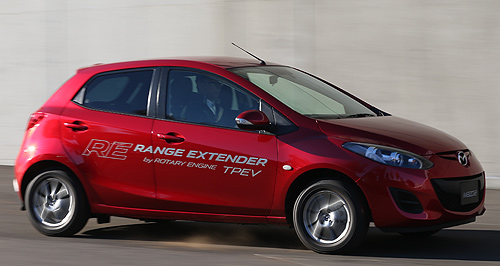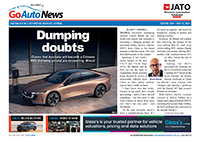Make / Model Search
Future models - Mazda - EVLA show: Mazda to debut EV in 2019Shock tactics: Mazda has already toyed with the idea of a rotary range extender, with the Mazda2 RE concept in 2013. First electric car from Mazda will use rotary engine as range extender17 Nov 2016 By TIM ROBSON in LOS ANGELES A SENIOR Mazda official has confirmed that the company is developing an electric vehicle that is set for release in 2019. Mazda Motor Corporation senior managing executive officer of research and development Kiyoshi Fujiwara confirmed to Australian journalists at the Los Angeles motor show that the company would build the car in time for a 2019 debut, but that the details were still “a big secret”. Mr Fujiwara did confirm, however, that the car would likely carry a rotary engine as a range-extending generator, similar to the Mazda2 RE concept of 2013. The revelation came during a discussion of Mazda’s growing relationship with fellow Japanese automaker Toyota, but Mr Fujiwara confirmed that the propulsion system would be made in-house, rather than sourced from elsewhere. “At Mazda, we are developing an EV system by ourselves,” said Mr Fujiwara. “Sharing (with Toyota) is a discussion point. We have not decided yet, but we are discussing it.” He refused to divulge details of the car’s potential size or range, but admitted that a larger car would likely require a new platform. “If a huge battery array is needed, then yes (we will need a new platform)”, he said. “But higher performance will require a higher price, so we are carefully considering (our options). Mr Fujiwara explained that an EV would help the company’s brand image, but would not become a “core product”. He also said that electrification will only be a relatively small part of the total propulsion picture even in 2020, and the petrol engine will still play a major role. “If battery costs could drop – say, one-fifth or one-tenth – it would be better (for EVs),” he said. “In 2020, for example, there will be five or 10 per cent of EVs in Europe, but the other 95 or 90 will still use internal combustion. It’s still very important.” Mr Fujiwara dismissed hybrid technology as not suiting Mazda’s current range of naturally aspirated engines, known as SkyActiv. “Hybrid is a very complicated technology,” he said, “and if we can develop SkyActiv further, then we can do without it. We would need a milder type of hybrid for SkyActiv.” And while Mr Fujiwara suggested the model would be on offer globally, it was not likely to suit all markets. “Of course we need EV, but it depends on the markets,” he said, citing Norway as an example of an EV-ready environment. Mazda Australia managing director Martin Benders is on record as suggesting the local market is not ready for electric vehicles, due to a lack of government assistance for potential customers. Currently, Mazda offers the Mazda3 in Japan with the battery pack and electric motor from the Toyota Prius, teamed up with a detuned version of its 2.0-litre naturally aspirated petrol engine. Sold as the Axela, it has been ruled out for Australia on several occasions by senior Mazda Australia management.  Read more8th of April 2016  Mazda patents next-generation rotary enginePatent files surface for Mazda’s new potentially mass production rotary engine25th of November 2013  Driven: Mazda’s range-extending rotaryThe rotary engine could live on as a flex-fuel generator for Mazda’s electric carsAll future models Alfa Romeo Alfa Romeo Abarth Abarth Alpine Alpine Alpina Alpina Audi Audi Aston Martin Aston Martin BMW BMW Bentley Bentley Chery Chery Brabham Brabham Chrysler Chrysler Chevrolet Chevrolet Cupra Cupra Citroen Citroen DS DS Dodge Dodge Fiat Fiat Ferrari Ferrari Foton Foton Ford Ford Great Wall Great Wall FPV FPV Haval Haval GWM GWM Honda Honda Holden Holden Hummer Hummer HSV HSV Infiniti Infiniti Hyundai Hyundai Jaguar Jaguar Isuzu Isuzu Kia Kia Jeep Jeep Land Rover Land Rover Lamborghini Lamborghini Lexus Lexus LDV LDV Mahindra Mahindra Lotus Lotus Mazda Mazda Maserati Maserati Mercedes-AMG Mercedes-AMG McLaren McLaren MG MG Mercedes-Benz Mercedes-Benz Mitsubishi Mitsubishi Mini Mini Opel Opel Nissan Nissan Peugeot Peugeot Pagani Pagani Proton Proton Porsche Porsche Renault Renault Ram Ram Rover Rover Rolls-Royce Rolls-Royce Skoda Skoda Saab Saab SsangYong SsangYong Smart Smart Suzuki Suzuki Subaru Subaru Toyota Toyota Tesla Tesla Volvo VolvoMotor industry news |
Click to shareMazda modelsResearch Mazda All future models Alfa Romeo Alfa Romeo Abarth Abarth Alpine Alpine Alpina Alpina Audi Audi Aston Martin Aston Martin BMW BMW Bentley Bentley Chery Chery Brabham Brabham Chrysler Chrysler Chevrolet Chevrolet Cupra Cupra Citroen Citroen DS DS Dodge Dodge Fiat Fiat Ferrari Ferrari Foton Foton Ford Ford Great Wall Great Wall FPV FPV Haval Haval GWM GWM Honda Honda Holden Holden Hummer Hummer HSV HSV Infiniti Infiniti Hyundai Hyundai Jaguar Jaguar Isuzu Isuzu Kia Kia Jeep Jeep Land Rover Land Rover Lamborghini Lamborghini Lexus Lexus LDV LDV Mahindra Mahindra Lotus Lotus Mazda Mazda Maserati Maserati Mercedes-AMG Mercedes-AMG McLaren McLaren MG MG Mercedes-Benz Mercedes-Benz Mitsubishi Mitsubishi Mini Mini Opel Opel Nissan Nissan Peugeot Peugeot Pagani Pagani Proton Proton Porsche Porsche Renault Renault Ram Ram Rover Rover Rolls-Royce Rolls-Royce Skoda Skoda Saab Saab SsangYong SsangYong Smart Smart Suzuki Suzuki Subaru Subaru Toyota Toyota Tesla Tesla Volvo VolvoMotor industry news |











Facebook Twitter Instagram